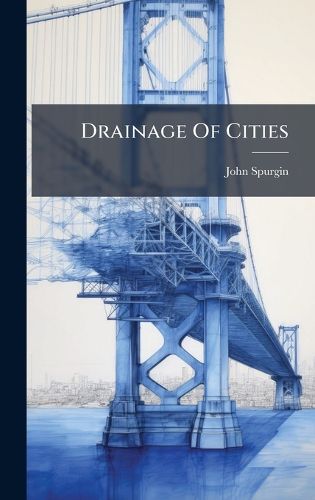Readings Newsletter
Become a Readings Member to make your shopping experience even easier.
Sign in or sign up for free!
You’re not far away from qualifying for FREE standard shipping within Australia
You’ve qualified for FREE standard shipping within Australia
The cart is loading…






"Drainage Of Cities" explores innovative approaches to urban sanitation and waste management, with a specific focus on reserving sewage for beneficial use and maintaining clean rivers. Addressing challenges particularly relevant to the Thames, John Spurgin advocates for sustainable practices in urban development. This historical work offers insights into 19th-century engineering and environmental concerns, providing a unique perspective on early efforts to balance urban growth with ecological responsibility. It remains relevant for those interested in the history of civil engineering, environmental science, and the ongoing quest for sustainable urban living. The book details practical methods for waste utilization and river preservation, making it a valuable resource for understanding the evolution of urban sanitation practices.
This work has been selected by scholars as being culturally important, and is part of the knowledge base of civilization as we know it. This work was reproduced from the original artifact, and remains as true to the original work as possible. Therefore, you will see the original copyright references, library stamps (as most of these works have been housed in our most important libraries around the world), and other notations in the work.
This work is in the public domain in the United States of America, and possibly other nations. Within the United States, you may freely copy and distribute this work, as no entity (individual or corporate) has a copyright on the body of the work.
As a reproduction of a historical artifact, this work may contain missing or blurred pages, poor pictures, errant marks, etc. Scholars believe, and we concur, that this work is important enough to be preserved, reproduced, and made generally available to the public. We appreciate your support of the preservation process, and thank you for being an important part of keeping this knowledge alive and relevant.
$9.00 standard shipping within Australia
FREE standard shipping within Australia for orders over $100.00
Express & International shipping calculated at checkout
"Drainage Of Cities" explores innovative approaches to urban sanitation and waste management, with a specific focus on reserving sewage for beneficial use and maintaining clean rivers. Addressing challenges particularly relevant to the Thames, John Spurgin advocates for sustainable practices in urban development. This historical work offers insights into 19th-century engineering and environmental concerns, providing a unique perspective on early efforts to balance urban growth with ecological responsibility. It remains relevant for those interested in the history of civil engineering, environmental science, and the ongoing quest for sustainable urban living. The book details practical methods for waste utilization and river preservation, making it a valuable resource for understanding the evolution of urban sanitation practices.
This work has been selected by scholars as being culturally important, and is part of the knowledge base of civilization as we know it. This work was reproduced from the original artifact, and remains as true to the original work as possible. Therefore, you will see the original copyright references, library stamps (as most of these works have been housed in our most important libraries around the world), and other notations in the work.
This work is in the public domain in the United States of America, and possibly other nations. Within the United States, you may freely copy and distribute this work, as no entity (individual or corporate) has a copyright on the body of the work.
As a reproduction of a historical artifact, this work may contain missing or blurred pages, poor pictures, errant marks, etc. Scholars believe, and we concur, that this work is important enough to be preserved, reproduced, and made generally available to the public. We appreciate your support of the preservation process, and thank you for being an important part of keeping this knowledge alive and relevant.